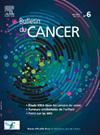Place de la chirurgie dans la prévention du cancer de l’œsophage
IF 1.1
4区 医学
Q4 ONCOLOGY
引用次数: 0
Abstract
Le pronostic du cancer de l’œsophage reste sombre en raison d’un diagnostic souvent tardif et du terrain souvent défavorable des patients. Ceci est illustré par des taux de survie nette standardisée à cinq ans qui ne dépassent pas 20 %, quel que soit le sexe. Contrairement au cancer gastrique (mutation du gène CDH1), il n’existe, à l’heure actuelle, aucune prédisposition génétique au cancer de l’œsophage justifiant la réalisation d’une œsophagectomie prophylactique. Ainsi, la prévention primaire, par l’identification et la prise en charge des facteurs de risque modifiables, constitue la meilleure stratégie préventive du cancer de l’œsophage. La place de la chirurgie dans la prévention du cancer de l’œsophage est rapportée dans cette synthèse. Bien que recommandée, l’intérêt de la chirurgie antireflux (fundoplicature) pour œsophage de Barrett, dans le seul but de diminuer le risque d’adénocarcinome de l’œsophage, reste discuté. Concernant la chirurgie bariatrique, les études de cohortes nationales rapportent une incidence équivalente ou diminuée du cancer de l’œsophage chez les patients opérés par rapport aux patients obèses non opérés. Néanmoins, considérant la nette augmentation du nombre de procédure bariatrique, des études complémentaires avec un recul plus important sont nécessaires. Enfin, bien que la myotomie chirurgicale soit une véritable option thérapeutique efficace pour le traitement de l’achalasie en première intention, son impact sur le risque de cancer de l’œsophage reste incertain et peu étudié.
The prognosis for esophageal cancer remains poor because it is often diagnosed late and patients often have unfavourable backgrounds. This is reflected in standardised 5-year net survival rates of no more than 20%, regardless of gender. Unlike gastric cancer (CDH1 gene mutation), there is currently no genetic predisposition to esophageal cancer that would justify prophylactic esophagectomy. Primary prevention by identifying and managing modifiable risk factors is therefore the best strategy for preventing esophageal cancer. The role of surgery in the prevention of esophageal cancer is discussed in this review. Although recommended, the value of antireflux surgery (fundoplication) for Barrett's esophagus with the sole aim of reducing the risk of esophageal adenocarcinoma remains controversial. With regard to bariatric surgery, national cohort studies report an equivalent or reduced incidence of esophageal adenocarcinoma in operated patients compared with non-operated obese patients. However, given the significant increase in the number of bariatric procedures, further studies with longer follow-up are needed. In addition, although surgical myotomy is a truly effective therapeutic option for the treatment of achalasia in the first-line setting, its impact on the risk of esophageal cancer remains uncertain and poorly studied.
求助全文
约1分钟内获得全文
求助全文
来源期刊

Bulletin Du Cancer
医学-肿瘤学
CiteScore
1.90
自引率
16.70%
发文量
224
审稿时长
37 days
期刊介绍:
Without doubt, the ''Bulletin du Cancer'' is the French language publication of reference in the field of cancerology. Official organ of the French Society of Cancer, this journal covers all the information available, whether in the form of original articles or review articles, but also clinical cases and letters to the editor, including various disciplines as onco-hematology, solids tumors, medical oncology, pharmacology, epidemiology, biology as well as fundamental research in cancerology. The journal proposes a clinical and therapeutic approach of high scientific standard and regular updates in knowledge are thus made possible. Articles can be submitted in French or English.
 求助内容:
求助内容: 应助结果提醒方式:
应助结果提醒方式:


